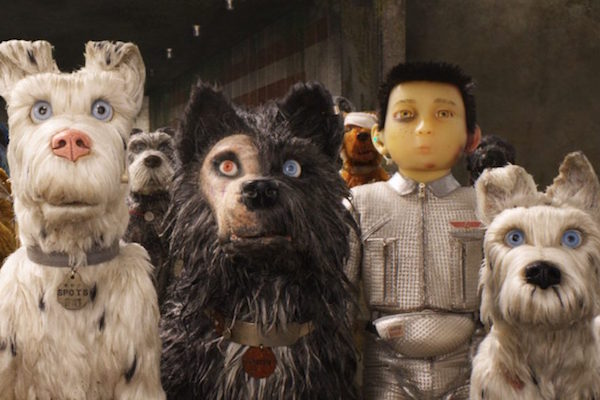
'Isle of Dogs' highlights stop-action puppet animation and resourceful canines
By Diane Carson
Writer/director Wes Anderson has a flair for combining quirky stories with imaginative stylistic choices. Consider "The Grand Budapest Hotel," "Moonrise Kingdom," and "Fantastic Mr. Fox," a stop action, animated film. Following in that vein, "Isle of Dogs" uses stop-action, puppet animation, again giving animals a voice in a radioactive, dystopian environment with clear parallels to contemporary ills.
Through a prologue and subsequent chapters, we enter the fictional Japanese city of Megasaki twenty years in the future as Mayor Kobayashi (Kunichi Nomura) exiles dogs to the accurately named Trash Island where they fight each other for survival. Tyrannized for ten centuries, the dogs suffer from an incurable snout fever and flu. The mayor's twelve-year-old nephew Atari, identified as "The Boy Samurai," travels in a rickety plane to Trash Island searching for his beloved "short-haired, oceanic speckle-eared sport hound" Spots. The four pack dogs--Rex, King, Duke, and Boss--plus the undomesticated canine Chief aid Atari, once they amusingly decide whether they're eating him or on a rescue mission. As the group seeks Spots, adventures follow with the Mayor sending robots and soldiers to capture Atari.
Episodic scenes benefit from exquisite design and clever exchanges, though several depictions are sad--dogs caged, hungry, even starving, and fighting. In other words, assess carefully before taking young children. The canine puppets' personalities do come to expressive life because of excellent voice talent: Edward Norton, Bill Murray, Jeff Goldblum, Scarlett Johansson, Bryan Cranston, Liev Schreiber, Greta Gerwig, Yoko Ono, Tilda Swinton, and more.
Cinematographer Tristan Oliver composes with superb, imaginative angles while production designers Adam Stockhausen and Paul Harrod include a wealth of cultural details. But while dog talk is in English, most of the Japanese is not translated nor are references explored for sumo wrestling, Kabuki theater, taiko drumming, classic paintings and films, notably those of iconic directors Akira Kurosawa. No, this isn't an educational documentary, but let's mine the content further given the Japanese setting. And must "Isle" insert an admirable American exchange student? Reservations noted, all dog lovers will applaud these resourceful canines and the affirmation of their importance in our lives.


